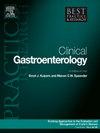Increased risk of oesophageal squamous cell carcinoma development
IF 3.2
3区 医学
Q2 GASTROENTEROLOGY & HEPATOLOGY
Best Practice & Research Clinical Gastroenterology
Pub Date : 2025-03-01
DOI:10.1016/j.bpg.2025.101984
引用次数: 0
Abstract
The incidence of oesophageal squamous cell carcinoma accounts for almost 85 % of all oesophageal cancers worldwide. Patients with oesophageal cancer can present with clinical symptoms including dysphagia, weight loss, retrosternal discomfort or regurgitation. Nevertheless, most cancers remain asymptomatic and thereby undetected until the cancer has reached advanced or even incurable stages. This results in poor prognosis and relatively low long-term survival rates. The identification of patients at high risk for oesophageal cancer development is therefore an important cornerstone in the detection of oesophageal cancer in early and curable stages. This group contains patients with a history of cancer in the aerodigestive tract, squamous dysplasia, certain lifestyle aspects, three types of genetic syndromes, caustic or radiation induced injury to the oesophagus and achalasia. In this review, we evaluate different risk factors for the development of oesophageal squamous cell carcinoma and discuss whether screening of these patients might be justified.
增加发展为食管鳞状细胞癌的风险
食管鳞状细胞癌的发病率几乎占全世界食管癌的85%。食管癌患者可出现吞咽困难、体重减轻、胸骨后不适或反流等临床症状。然而,大多数癌症仍然没有症状,因此直到癌症达到晚期甚至无法治愈的阶段才被发现。这导致预后不良和相对较低的长期生存率。因此,识别食管癌发展的高危患者是早期发现和可治愈食管癌的重要基石。这一组包括有空气消化道癌症史、鳞状发育不良、某些生活方式、三种遗传综合征、腐蚀性或放射性引起的食道损伤和贲门失弛缓症的患者。在这篇综述中,我们评估了食管鳞状细胞癌发展的不同危险因素,并讨论了这些患者的筛查是否合理。
本文章由计算机程序翻译,如有差异,请以英文原文为准。
求助全文
约1分钟内获得全文
求助全文
来源期刊
CiteScore
5.50
自引率
0.00%
发文量
23
审稿时长
69 days
期刊介绍:
Each topic-based issue of Best Practice & Research Clinical Gastroenterology will provide a comprehensive review of current clinical practice and thinking within the specialty of gastroenterology.

 求助内容:
求助内容: 应助结果提醒方式:
应助结果提醒方式:


